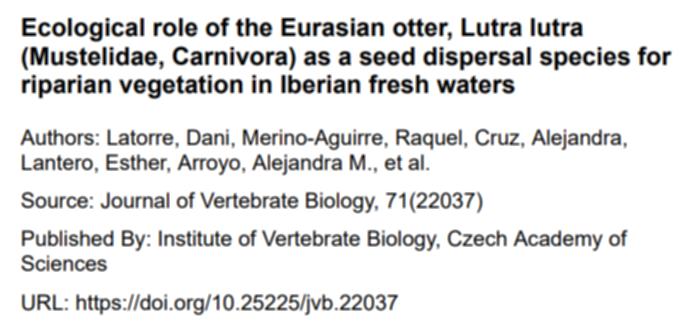Por favor, use este identificador para citar o enlazar este ítem:
http://hdl.handle.net/10637/15159Ecological role of the Eurasian otter, Lutra lutra (Mustelidae, Carnivora) as a seed dispersal species for riparian vegetation in Iberian fresh waters

Ver/Abrir:
Ecological_Latorre_et_al_Jou_VerBio_2022.png
81,5 kB
image/png
Ver/Abrir:
Ecological_Latorre_et_al_Jou_VerBio_2022.pdf
Acceso restringido
1,07 MB
Adobe PDF
Request a copy
| Título : | Ecological role of the Eurasian otter, Lutra lutra (Mustelidae, Carnivora) as a seed dispersal species for riparian vegetation in Iberian fresh waters |
| Autor : | Latorre, Dani Merino-Aguirre, Raquel Cruz Varona, Alejandra Lantero Bringas, Esther Arroyo, Alejandra M. |
| Materias: | Dietary traits; Endozoochory; Frugivory; Germinability; Spraint analysis |
| Editorial : | Institute of Vertebrate Biology, Czech Academy of Sciences |
| Citación : | Dani Latorre; Raquel Merino-Aguirre; Alejandra Cruz; Esther Lantero; Alejandra M. Arroyo; David H. Fletcher; David Almeida (2022). Ecological role of the Eurasian otter, Lutra lutra (Mustelidae, Carnivora) as a seed dispersal species for riparian vegetation in Iberian fresh waters. Journal of Vertebrate Biology, 71: 22037.1-11 Institute of Vertebrate Biology, Czech Academy of Sciences. (Online: 7/09/2022). ISSN: 0139-7893, e-ISSN 1573-1189. |
| Resumen : | Endozoochory is a mutualistic interaction between plants and animals. Such a relationship has rarely been examined in the Eurasian otter Lutra lutra. This study aimed to assess the use and electivity of fruit by this carnivore, along with the viability of ingested seeds. Otter spraints and fruit were collected from the River Bullaque (Guadiana River basin, central Spain) in June and September 2018-2019. A high occurrence of fruit (> 40%) was found in spraints during September. Otters ingested fruit in June from only one plant species: Iberian bushweed Flueggea tinctoria (Phyllanthaceae); whereas seeds ingested in September belonged to four plant species: apple mint Mentha suaveolens (Lamiaceae), common hawthorn Crataegus monogyna, dog rose Rosa canina and elmleaf blackberry Rubus ulmifolius (three Rosaceae species). According to the environmental availability, otters displayed avoidance for mint and rose, neutral selection for hawthorn and preference for blackberry. Germination was unsuccessful for mint seeds, whereas germination was the highest for blackberry (37%; 49% for blackbird Turdus merula, a well-known frugivorous species). Otters appear to display an ecological role as seed dispersers for riparian vegetation in Iberian fresh waters. These findings provide insights into this endozoochorous co-evolution between plants and Carnivora. |
| URI : | http://hdl.handle.net/10637/15159 |
| Derechos: | http://creativecommons.org/licenses/by-nc-nd/4.0/deed.es |
| ISSN : | 1573-1189 |
| Fecha de publicación : | 7-sep-2022 |
| Centro : | Universidad San Pablo-CEU |
| Aparece en las colecciones: | Medicina |
Los ítems de DSpace están protegidos por copyright, con todos los derechos reservados, a menos que se indique lo contrario.

